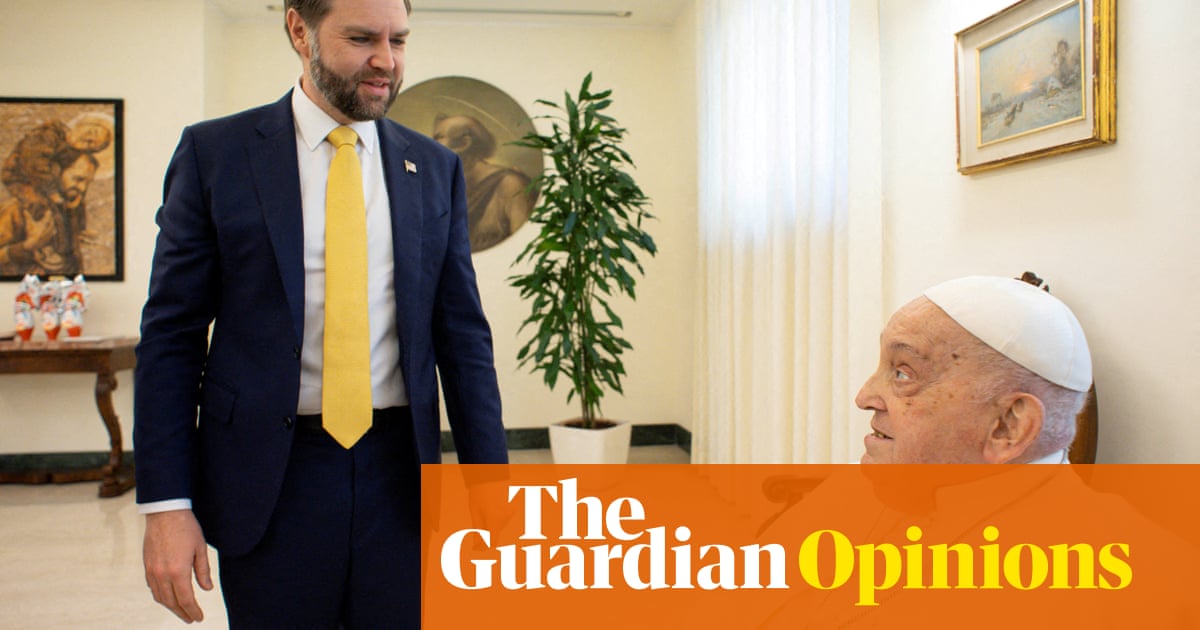What doLiz Trussand JD Vance have against elderly people? Specifically, those who are kind, decent and compassionate.
Take Radon Liz. In September 2022 she made a fleeting visit to Balmoral to be sworn in as prime minister by the queen. The last picture that was taken of Queen Elizabeth was of her standing in front of a fireplace next to Truss. You can’t escape the desperation in her eyes. Please, please, she seems to be pleading, get me away from her.
Just put yourself in the queen’s shoes. You’ve done a lifetime of service to the nation. Your first-ever prime minister was Winston Churchill, back when politicians were real politicians. And then just when you should be starting to take it easy, you get lumbered with David Cameron, Theresa May and Boris Johnson. And then just when you think you might be in the clear, along comes the Trusster. Literally the dimmest prime minister of all times. Even 49 days of Radon Liz was 47 too many.
On Easter Sunday, the US vice-president was at it. Forcing his way into the Vatican on one of the holiest days of the year to get an audience with a pope, who was clearly very unwell. That must have been one hell of a confession he had to make. His loathing of migrants, people dear to Francis. There again, the pope was a very forgiving man. So maybe he didn’t feel he could say no.
Imagine it. Of all the vice-presidents that popes could have met over the last two and a half centuries, Francis had to make do with Vance. A man with whom he profoundly disagreed on most issues. It was his burden that he had wasted part of his last day on Earth with Vance. His last sacrifice in a lifetime of sacrifice.
Though, I suppose it could have been worse. He might have spent the afternoon with Donald Trump. Agent Orange had to make do with an impromptu eulogy. “The pope was a good guy,” he said. “A hard worker.” Somehow you can always rely on The Donald to come up with the wrong words at the wrong time. A total failure to understand the importance of Francis’s papacy. You got the feeling Trump reckoned he’d have made a much better pope. You know, poping. He could do poping better than anyone else had ever done it. The bigliest pope.
It makes you wonder where Liz and JD could go next. Perhaps it might be possible to steer them away from people who actually make the world a better place. Put them in front of men and women we can all do without.
Perhaps a visit to the Kremlin may be in order. The world could do with less Vladimir Putin. If that worked they could emerge as latter-day heroes.
While some were eyeing up an alternative, more benign, future for Radon Liz, the government was having to deal with the fallout of yet another downbeat, economic forecast from the International Monetary Fund. Growth was revised down from 1.6% to 1.1% for the UK. Largely owing to the fallout from the trade war caused by Trump’s tariffs.
Germany, Italy and France were predicted to take less of a hit. That must be the Brexit bonus we have been hearing so much about recently. Rachel Reeves tried to spin it as best she could. Kemi Badenoch was far too busy fighting a culture war to notice.
Keir Starmer, meanwhile, was dealing with a culture war of his own after the supreme court’s ruling on how women are defined in equality law. And was sounding pretty chipper about it. He has come on quite the journey. Not so long ago, he was getting himself tied up in knots over whether all women had a cervix. Now he was hailing the judgment as a victory. “I welcome the clarity,” he said. Rather ignoring the fact the issue was rather more nuanced than some campaigners would have us believe.
Still, you could understand Starmer’s relief. The supreme court had dug him out of a hole. The judges could have said it was not for the courts to define biological sex and it was a decision politicians should make instead. As it was, he was off the hook. The court had done his work for him. His hands were now tied.
So … on the day more than 1 billion Catholics were grieving the death of a pope and the UK economy was given another kicking, most politicians in Westminster were being asked about who could go to which toilets. Media outlets that traditionally railed against the nanny state were now all for it. Trans women should use male toilets, Bridget Phillipson, the equalities minister declared. Which presumably means that trans men must use female toilets. I have a feeling we haven’t heard the end of this.
